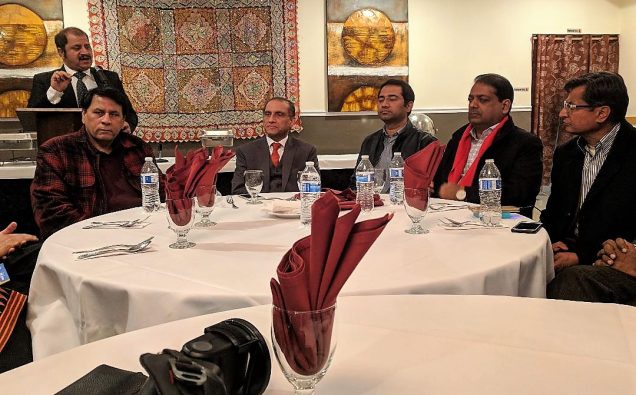
Journalism in the rapidly changing environment has a lot of new opportunities. However, it also faces many new challenges. In several developing countries, challenges facing working journalists outweigh opportunities, especially when journalists investigate corruption and misuse of power.
In Pakistan, the problems confronting the free Press are numerous, as highlighted at a recent event in Springfield, Virginia, hosted by Press Association of Pakistani Americans. President of Pakistan Federal Union of Journalists Afzal Butt and President Islamabad International Press Club Shakeel Anjum shared their experiences. Pakistan’s ambassador to the United States Aizaz Chaudhry was also invited to attend the event. He spoke about Pakistan’s relations with the United States.
The subject of the challenges facing the Pakistani media is getting attention of Pakistani-Americans. My organization, The Global Beat, in collaboration with Views and News International, the owner of Views and News online magazine (viewsnews.net) has been regularly hosting conversations on media issues.
So, the event in Springfield was another important occasion for journalists in Washington metro area as they came together to discuss the state of the media in Pakistan.
In his remarks, President PFUJ Afzal Butt pointed to a number of security challenges that journalists face across Pakistan.
“Personal security is a big challenge for media people, especially for those who perform their duties in militancy-hit areas. They are often targeted by the militant outfits,” he said, noting that acts of violence against working journalists go unnoticed and unpunished.
As Butt was speaking about different conflicting issues, I was thinking about Zamir Niazi’s most popular book on restriction on the free Press during military rule “The Press in Chains.”
The situation now has improved a little bit, but much remains to be done as several parts of the country are dangerous for the independent media representatives.
It looks like the only change in media has been the mushroom growth of channels, often criticized as a freedom without responsibility,
Butt’s voice was filled with concern for his fellow journalists in Pakistan, who are often the target of retaliation from the vested interests from feudal chiefs to representatives of the establishment.
A few years ago there was news of a hopeful development. There was a journalist safety bill of 2014, on the initiative of PFUJ, all the mainstream political parties agreeing to pass it in the Parliament. But as it turned out, this bill was not for the safety of the journalists. It was a measure aimed at controling the free Press. Instead of guaranteeing their safety and security, journalists were to be tamed.
According to the section 6 of this bill, it restricts Press associations and media houses to get permission from the Government before sending a journalist to a security-sensitive or troubled area. In case they don’t comply with the new rules, their media house could be banned for three months and fined around $200, 000.
Another side of the discussion was about who is a genuine journalist. Many journalists in Pakistan with long experience do not consider the crop of anchorpersons as being true journalists for the reason that they have never actually lived or experience journalism on ground and just sit in front of TV screens to pass judgement on the issues. Some of them openly take sides with power players in a setback to unbiased professional journalism.
The discussion also touched on the attitudes and manipulation tactics of media owners, who do not compensate journalists for their work, and keep them under the threat of sacking any time. Another hurdle in the way of a free Press is the lack of interest shown by the media owners and the government in addressing issues facing the media workers.
The accumulation of power in the hands of the media owners – since waiver of cross-media ownership restriction – has made them much more influential. Then there is the issue of proper training of journalists, awareness about the codes of ethics and security precautions.
On an upbeat note, President of Islamabad International Press Club Shakeel Anjum offered Pakistani journalists in Washington associate membership of the Islamabad Press Club.

















